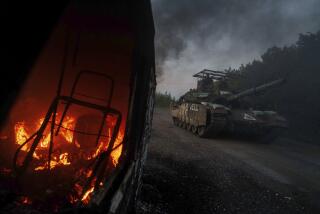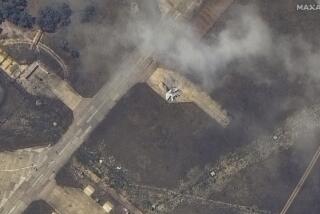Yeltsin Threatens Military Force in Restive Russian Republic of Chechnya : Caucasus: Moscow has intervened covertly for four months. Secessionist leader rejects ultimatum.
- Share via
MOSCOW — After four months of covertly supporting an ineffective guerrilla force, President Boris N. Yeltsin on Tuesday threatened direct military intervention against the oil-rich Russian republic of Chechnya and its Muslim secessionist leader.
Jet fighters with Russian markings bombed the Chechen airport later in the day, destroying four civilian aircraft and two fuel storage tanks. Airport authorities said 10 people died in the raid, the first by fixed-wing aircraft since the fighting erupted in August. One of the raiding warplanes was shot down.
Russia’s Defense Ministry denied staging the air attack. But Yeltsin warned that he will impose a state of emergency in Chechnya and enforce it with troops unless both the secessionist government and the rebels stop fighting, disarm themselves and free their prisoners by 6 a.m. Thursday.
Gen. Dzhokar Dudayev, the Chechen strongman who declared independence from Moscow three years ago, rejected the ultimatum. That sets the stage for a confrontation risky for him and Yeltsin, one that many fear could destabilize the Caucasus region along Russia’s southwestern border.
Chechnya is a tiny but unruly ethnic republic of 1.2 million people with a history of persecution by Russian czars and Soviet rulers. Although no nation formally recognizes its independence, Dudayev, a former Soviet bomber pilot, is widely viewed in the Caucasus and the Middle East as a symbol of resistance to Russian imperialism.
While Russia has been buffeted by recent ethnic conflict in Georgia, Azerbaijan and Tajikistan, the showdown in Chechnya has brought the threat of serious bloodshed to Russian soil for the first time since the Soviet Union broke apart in 1991. Officials say 76,216 ethnic Russians have left Chechnya since August.
Dudayev is believed to have an army made up of tens of thousands of conscripts, several combat jets, 78 tanks and armored personnel carriers, and a few dozen helicopters. He is also supported by hundreds of volunteers and mercenaries armed with some of the estimated 50,000 automatic weapons left behind by the retreating Soviet army.
Yeltsin issued his ultimatum in a Kremlin communique after Dudayev threatened to execute about 70 ethnic Russians, including army servicemen, captured Saturday during a failed rebel assault on his presidential palace. Dudayev said Sunday that they would be spared only if Moscow admitted supporting the offensive.
The Chechen leader backed down Monday, saying the captives would be treated as POWs.
Yeltsin went ahead anyway with his ultimatum, which amounts to a demand that Dudayev disband his armed forces.
“All forces and resources at the disposal of the state will be used to put an end to the bloodshed to defend the life, rights and freedoms of the citizens of Russia and to restore constitutional legality, law and order and peace in the Chechen republic,” Yeltsin said.
Chechen rebels fighting Dudayev said they were suspending their military campaign and putting their cause in Moscow’s hands.
Dudayev responded in an interview with the Russian news agency Interfax: “The Chechen people will not give up independence, even against the might of the entire Russian army.”
Russian leaders, including officials in other Caucasus republics within Russia, supported Yeltsin’s ultimatum. Defense Minister Pavel S. Grachev said “everything would be over within a couple of hours” if the Russian army intervened.
But other Russians warned that Dudayev may be more dangerous as a guerrilla leader and that Yeltsin should be careful not to plunge Russian troops into a quagmire.
“The military way should be excluded,” said former Soviet President Mikhail S. Gorbachev. Recalling Russia’s long, bloody conquest of the region in the 19th Century, he added: “We may have a second Caucasus war if troops and tanks are sent to Chechnya.”
A more recent lesson came in November, 1991, when Yeltsin decreed a state of emergency to try to prevent Dudayev’s inauguration as Chechnya’s elected president. Thousands of Dudayev supporters surrounded a contingent of Russian soldiers sent to enforce the measure, and the Russian Parliament failed to ratify it. The soldiers were withdrawn two days later.
Until last summer, the Kremlin appeared willing to let Chechnya stew in its economic decline, as a negative example of separatism. But growing ethnic nationalism in Russia and Chechen terrorist attacks on buses elsewhere in Russia led Moscow to back a hastily assembled rebel force, which is reportedly supplied with Russian tanks and helicopters.
Some Russian politicians, including the ultranationalist lawmaker Vladimir V. Zhirinovsky, objected Tuesday that Russian service personnel had ended up in a covert role on the rebel side. The Russian Defense Ministry admitted that some of its soldiers had been captured in Chechnya but insisted that they were there on leave.
Russia’s Interior Ministry said it was massing troops around Chechnya’s perimeter and bolstering security at Russian nuclear power stations and other possible targets of Chechen terrorists.
Reports from Grozny, the Chechen capital, said many residents fled to the suburbs Tuesday while thousands of Dudayev supporters rallied in the central square.
Dudayev was holding a news conference in the presidential palace when the air strikes began. The sound of the bombing sent journalists scrambling for cover, but Dudayev continued to speak calmly, the Associated Press reported. He called Yeltsin’s government a band of “Satanists” and accused them of ordering the raid.
Chechen authorities later said eight Soviet-era jets carried out the bombings, damaging several apartment buildings in Grozny as well as the airport. They said two combat helicopters with Russian markings also were shot down Tuesday.
Russia’s Unruly Republic
A look at the conflict-plagued republic of Chechnya:
GEOGRAPHY: Oil-rich region of 1.2 million people in the northern Caucasus Mountains of southern Russia. Moscow considers the area vital to maintaining its influence throughout the Caucasus.
HISTORY: Became part of Russia in 1859 after series of bloody wars. Declared independent in 1991 by newly elected President Dzhokhar Dudayev, a former Soviet air force general. Moscow does not recognize Chechnya’s independence.
CLASHES: Dozens of people reported killed and wounded in recurrent clashes between Dudayev’s troops and opposition forces.
RUSSIAN ROLE: Dudayev says Moscow provides opposition with weapons, troops. Russia provides political and reportedly financial aid, but denies military involvement.
More to Read
Sign up for Essential California
The most important California stories and recommendations in your inbox every morning.
You may occasionally receive promotional content from the Los Angeles Times.













